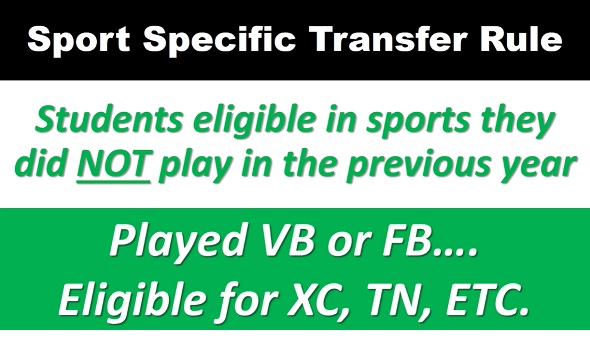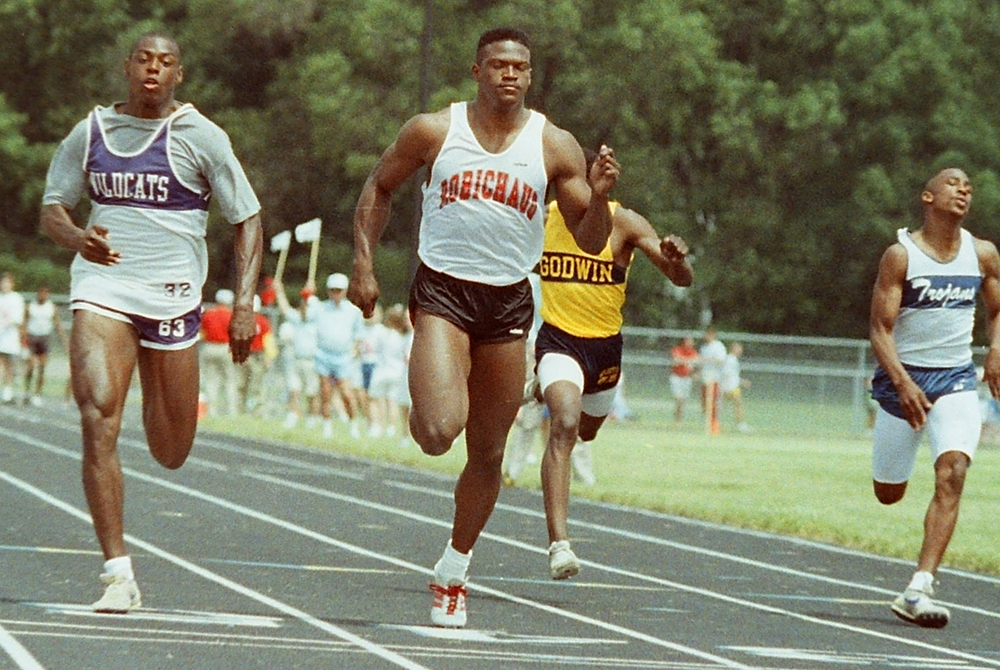
Brush Up on the New Transfer Rule
July 18, 2019
By Rob Kaminski
MHSAA benchmarks editor
Eligibility under the new “sport-specific” transfer rule begins this coming fall after circulating extensively for nearly one school year.
Unless one of the stated 15 exceptions is met, participation during the 2018-19 school year determines eligibility for 2019-20.
The new rule adopted by the Representative Council at its May 2018 meeting has found support among most audiences. A transfer student’s eligibility in 2019-20 is based upon that student’s participation from this past school year (2018-19). It will be paramount for administrators and coaches to have awareness of the sports a transfer student participated in during the previous school year.
The long-standing 15 Exceptions to immediate eligibility, such as a full and complete residential change or a student moving between divorced parents by completing of an Educational Transfer Form, did not change.
One might call the rule on the way out “The Fourth-Friday Transfer Rule.” Under this old rule, when a student enrolled at the new school determined his or her eligibility. Under the new Sport Specific Transfer rule, what a student played in the previous season determines eligibility.
The Council passed a more lenient rule on the one hand and more restrictive on the other. The more lenient aspect is a change that finds a transfer student ELIGIBLE in any sport in which he or she did not participate in a game or a scrimmage in the previous school year.
The more restrictive portion tends to discourage students who change schools for sports reasons. A transfer student who did play a sport in the previous season – and who does not meet one of the 15 Exceptions – is NOT ELIGIBLE in that sport for the next season. If a student changes schools in mid-season, the student would be ineligible for the rest of that season in that sport and the next season for that sport.
Participation under this and other rules means playing in an interscholastic game or scrimmage after starting the 9th grade at any high school. It does not mean practice, but entering an interscholastic game, meet or scrimmage in any way. It also may involve more than one sport, so a three-sport athlete who does not have a residential change and transfers would be ineligible in those sports during the next school year – but eligible for any other sport. It also means a student cut from a team – one who never entered a scrimmage or game – may transfer and play without delay for that new school’s team. It may also mean that a student who meets one of the stated exceptions such as a residential change but enrolls in a school other than her or his school of residence, would have eligibility in sports not played in the previous year.
The new rule will tend to discourage students from changing schools for sports because they would be ineligible in any sport they have played in school the previous season for that sport. It will increase participation for some students who were otherwise not eligible under the current rule.
It is always best to contact school athletic directors who can connect with the MHSAA to verify eligibility prior to enrollment.
If the student’s new school requests in writing, the MHSAA Executive Committee may approve a waiver that reduces the period of ineligibility to 90 scheduled school days at the new school if the change of schools was for compelling reasons demonstrated with outside documentation having nothing to do with sports, curriculum, finances, and school demographics. The Executives Committee also has authority to approve immediate eligibility.

Robichaud 3-Sport Legend Wheatley Selected to National High School Hall of Fame
By
Geoff Kimmerly
MHSAA.com senior editor
March 11, 2024
The playing career of 1991 Dearborn Heights Robichaud graduate Tyrone Wheatley remains one of the most storied in Michigan high school sports history. His prestige gained during that early stage of his athletic stardom has been recognized nationally as well, as Wheatley was one of 12 honorees announced today as this year’s inductees into the National High School Hall of Fame by the National Federation of State High School Associations (NFHS).
Wheatley – who grew up in Inkster and is currently the head football coach at Wayne State University – will be inducted as one of 11 honorees selected for the 41st Hall of Fame class at a ceremony during the NFHS summer meeting July 1 in Boston. The rest of the class is made up of three more athletes, four coaches, two former state association administrators and a game official. Wheatley was nominated by the Michigan High School Athletic Association.
Wheatley will become the Hall of Fame’s 10th inductee from Michigan, joining the MHSAA’s first full-time Executive Director Charles E. Forsythe (inducted 1983), River Rouge boys basketball coach Lofton Greene (1986), Warren Regina athletic director, softball and basketball coach Diane Laffey (2000), Fennville basketball and baseball standout Richie Jordan (2001), Grosse Pointe Woods University Liggett boys and girls tennis coach Bob Wood (2005), Bloomfield Hills Cranbrook hockey standout Jim Johnson (2007), Owosso football, basketball and baseball all-stater Brad Van Pelt (2011); Vermontville Maple Valley baseball national record holder Ken Beardslee (2016) and retired MHSAA Executive Director John E. “Jack” Roberts (2022).
To the greater public, Wheatley surely is best known as a star running back for University of Michigan who went on to play 10 seasons in the NFL for the New York Giants and Oakland Raiders. However, he is arguably most glorified in Michigan high school athletics for his accomplishments on the track, where as a junior in 1990 he became the first (of still only two) athletes to win four individual events at an MHSAA Lower Peninsula Finals – placing first in the 100 and 200-meter dashes, 110-meter hurdles and long jump. He led Robichaud to the Class B team title that day, scoring 40 of its 49 points. Wheatley completed his high school career in 1991 with three more Class B individual track & field championships and nine total over his final three seasons; he was injured in the 100 during that senior-year meet and could not run his final race to attempt another four-title day.
Wheatley’s meet records of 13.7 seconds in the 100 at the 1991 LP Class B Final and 23-10¾ in long jump in 1989 still stood when the four-Class track & field format was retired after the 1999 season. He also remains the only athlete to win the 100 three times at the prestigious Mehock Relays in Mansfield, Ohio, also finishing first in the 110 hurdles and 200 and runner-up in the long jump at that meet in 1991.
Wheatley was similarly accomplished on the high school football field, leading his team to a state championship in 1990 and earning a Parade All-America honor. Over three varsity seasons total he ran for a combined 4,257 yards and 67 touchdowns, including 2,010 yards and 33 scores on 208 carries as a senior in 1990 – the latter despite playing quarterback half of that season (and throwing five touchdown passes). He played quarterback, running back, defensive back, punter, kicker and returned kicks, and he scored 252 points over 13 games as a senior and 484 over 38 career games.
Wheatley also was a standout on the basketball court for Robichaud, averaging 14 points and 16 rebounds per game as a senior in earning all-state recognition in that sport as well.
“My city where I come from, Inkster, means the world to me. I grew up in an incredible era of sports in Michigan (with successful University of Michigan and Detroit pro teams) … but if you ask me who my idols were, they were the guys I grew up with playing on the playground,” Wheatley said. “After you come from a basketball game where you see Jarvis Walker drop 30, or Earl Jones running the last 200 of a race backwards … you hear people talk about them, you hear their reverence about them, and I just wanted to be put in the conversation of the best to come out of Inkster, forget the state. I can tell you this for sure: I’m not the best athlete to come out of Inkster, just the person who got the recognition. And my foundation was built watching, taking notes, preparing, working out and just trying to be one of the guys.
“(Robichaud was) the step. Because without Robichaud … Michigan, the NFL, me coming back to coach, it doesn’t happen,” Wheatley said. “Without the Robert Yaucks (his football coach at Robichaud), the Coach (Leit) Jones (his Robichaud track coach), the Coach (Mercer) Brysons, the (coach) Wade Cooks, the (coach Jeff) Flounorys, the Millie Hursins (his academic advisor) of the world, this doesn’t happen. Without my high school teammates, none of this happens. So it’s not just a step. What’s the saying – the first impression is the lasting and best impression? Robichaud was it.”
Wheatley returned to Robichaud as its varsity football coach in 2007 and led that team to a 9-2 record and the MHSAA Playoffs for the first time since 1994 – after Robichaud had finished 0-9 the previous season. He has served as an assistant football coach at four college programs including U-M and Syracuse, and with the Buffalo Bills, Jacksonville Jaguars and Denver Broncos.
He also served as Morgan State University's head coach from 2019-21 and just completed his first season as head coach at Wayne State, which finished 3-8 – an improvement of two wins from 2022 and the program’s best record since 2019.
Wheatley graduated from University of Michigan in 2008 with a bachelor’s degree in kinesiology. He and wife Kimberly have five children: Tyrone Jr., Terius, Tyrique, Tiana and Tamari. Tyrone Jr., an offensive tackle, played this past season for the New England Patriots.
“Many of us who grew up in Michigan grew up as fans of Tyrone Wheatley because of what he accomplished at the college level – but his legendary story begins at Dearborn Heights Robichaud, where his outsized athletic ability was on full display in every sport he played,” MHSAA Executive Director Mark Uyl said. “Michigan has produced several professional athletes in a variety of sports and nearly 50 Olympians in track & field alone, and what Tyrone Wheatley achieved as a high school athlete remains a standard few have approached. We are ecstatic that he will deservedly take his place among the all-time elite high school athletes nationally as well.”
The National High School Hall of Fame was started in 1982 by the NFHS. The 11 individuals were chosen after a two-level selection process involving a screening committee composed of active high school state association administrators, coaches and officials, and a final selection committee composed of coaches, former athletes, state association officials, media representatives and educational leaders. Nominations were made through NFHS member associations. Also chosen for this class were athletes Joe Mauer (Minnesota), Takeo Spikes (Georgia) and Dot Ford Burrow (Mississippi); sport coaches Paula Kirkland (South Carolina), Gary Rankin (Tennessee), Roy Snyder (Pennsylvania) and Ronald Vincent (North Carolina); former state association administrators Mike Colbrese (Washington) and Marie Ishida (California), and baseball/football game official David Core (Oklahoma).
For more on this year’s Hall of Fame class, visit the NFHS Website.
PHOTO Tyrone Wheatley crosses the finish line first during one of his nine MHSAA Finals track & field championship victories. (MHSAA file photo.)

